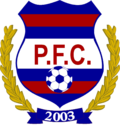Paysandú FC
| Paysandú FC | |||

|
|||
| Basic data | |||
|---|---|---|---|
| Surname | Paysandú Fútbol Club | ||
| Seat | Paysandú , Uruguay | ||
| founding | March 7, 2003 | ||
| president |
|
||
| First soccer team | |||
| Venue | no own; The game is played in Parque Artigas (owner: Intendencia Municipal de Paysandú) Paysandú , Uruguay |
||
| Places | 25,000 | ||
| league | none, crew withdrawn | ||
|
|
|||
The Paysandu Fútbol Club , shortly Paysandú (nicknamed Sanduceros ) is a football club from the Departamento Paysandú located namesake Paysandú in western Uruguay . The club is currently not participating in competitions within the framework of the Uruguayan football association AUF .
history
The association was founded on March 7, 2003. It emerged from the merger of the Barrio Obrero , Centenario , Deportivo América, Estudentil , Independiente , Juventud Unida , Olimpico and Paysandú Wanderers clubs . From 2003 to 2005 the club belonged to the Segunda División . In the first season of 2003, the team trained by Carlos Cabillón qualified as Group B winners for the finals for the 2003 Torneo Apertura title of the second division, but finally lost in the playoff final second leg against Rocha Fútbol Club on September 27, 2003 (The first leg was won 2-0) with 1: 4. After the second half of the season (Clausura) was less successful, the first second division season ended as 14th in the overall final table. In the 2004 season, after the Apertura, it was eleventh place in the table. The second half of that season, which was shortened due to a players' strike, ended in fourth place in Group A. In the overall season table, it was only tenth. In the series, which was characterized by player strike and team expulsions, this entitlement nevertheless to promotion, as the leap into the upper house of football was granted to the top-ranked club in the interior due to the promotion regulation at the time. They hadn't actually achieved this goal either, as local rivals Paysandú Bella Vista came in eighth. However, the indebted competitor could not settle liabilities in the amount of 100,000 US dollars, which is why the UP on December 22, 2004 denied him the promotion. This in turn benefited Paysandú FC. In Torneo Especial 2005, the mid-season in the transition phase to the European league host mode with half-series break at the turn of the year, and the subsequent 2005/06 season, the club played in the top Uruguayan league, the Primera División . The Torneo Especial finished as 14th. In the following season it was enough in the Apertura 2005, in which Ramiro Bruschi was the team's most successful goalscorer with six goals, only to 18th and thus last place in the table. Due to the relegation regulation in this intermediate phase, this meant relegation at the end of the year, although the Clausura of the 2005/06 season was only played afterwards. The following second division season held the end of professional football ready for the club. After they took part in Torneo Apertura and finished 14th and third last of the teams taking part in the game ( CD Colonia did not play at the beginning of the season) and Alcides Bandera (six goals) was also one of the more successful scorers in the series, followed by Clausura the out for economic reasons. Participation in the competition no longer took place.
Oddities
In April 2005, Paysandú played in his home game of the Primera División against Cerro in front of only 30 paying spectators, so that there were more active, police and law enforcement officers than supporters in the stadium. 2945 spectators wanted to see the game of the club, which does not have a large following in the population, against Peñarol this season .
Individual evidence
- ↑ World Stadiums - Stadiums in Uruguay
- ^ Uruguay 2003 Second Level at www.rsssf.com, accessed December 26, 2012
- ^ Uruguay Second Level 2004 at www.rsssf.com, accessed December 26, 2012
- ^ Uruguay 2005 at www.rsssf.com, accessed December 27, 2012
- ↑ Uruguay 2005/06 on rsssf.com, accessed December 27, 2012
- ^ Uruguay Second Level 2006/07 at www.rsssf.com, accessed December 27, 2012
- ↑ The big book of football records: superlatives, curiosities, sensations by Omar Gisler